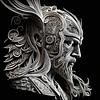Take a photo of a barcode or cover
adventurous
medium-paced
Plot or Character Driven:
A mix
Strong character development:
Yes
Loveable characters:
Yes
Diverse cast of characters:
Complicated
This is the first and only Arthurian retelling I've made it past the first chapter and actually finished the book. I enjoyed it for the most part, but I don't think I'll continue with the series because I don't really like Merlin or Arthur.
adventurous
challenging
dark
emotional
inspiring
reflective
medium-paced
Plot or Character Driven:
Character
Strong character development:
Yes
Loveable characters:
Yes
Diverse cast of characters:
Yes
Flaws of characters a main focus:
Yes
adventurous
dark
fast-paced
Plot or Character Driven:
Character
Strong character development:
Yes
Loveable characters:
Yes
Diverse cast of characters:
Complicated
Cynical, gritty fantasy about post-Roman Britain where everything and everyone is ugly and grim; the men, the women, the pagans, the christians, even the nature. There is no magic or beauty in this world.
I read this 25 years ago and remember liking it, so I grabbed this again as I wanted some easy escapism. What a mistake! The book is well written though, and I like the Brittonic setting.
I read this 25 years ago and remember liking it, so I grabbed this again as I wanted some easy escapism. What a mistake! The book is well written though, and I like the Brittonic setting.
Graphic: Misogyny, Rape, Sexism, Torture, Toxic relationship, Violence, Religious bigotry, Murder
very slow... not as interesting as I had hoped... also reading Stonehenge (same author) am enjoying it more.
Some of my earliest memories of the world of fiction and story telling involve tales of King Arthur and his Knights of the Round Table. Most have read at least one such story in their childhood while many of us have consumed many versions of this classic and continue to do so to this day. So it was with a mixture of anticipation and some trepidation that I began this trilogy. Not having read Cornwell's well-received "Sharpe" novels, but having been inundated with praise for them, I wondered at how he would tackle this tale. Isn't it a bit presumptuous to re-tell such an oft-told tale? In fact, Cornwell, himself, says much the same thing. After all, hasn't it all been said?
Not at all! We catch a quick glimpse of Cornwell's approach, right from the start, with the title. This is "The Warlord Chronicles". And, indeed, it is. Arthur is the son of Uther and therefore not in line to become King. Instead, he is a warlord, assigned as Mordred's protector. His main goal, however, is to unite all of Briton's divisive tribes against the common enemy: the soon-to-invade Saxons.
If you are looking for a traditional approach to the telling of the tale of Arthur, look elsewhere. This rendition is brutal, realistic, and fascinating. As Cornwell, himself, says, "There is a sword and there is a stone, but one is not in the other." In fact, many of the popular elements that we have come to expect are simply not there. Most of the familial relationships are different than I had assumed, i.e. Mordred, Uther, Morgan, Igraine, Guinivere, Arthur, etc. Cornwell takes them all and comes up with a plausible course for his characters to take.
The story is told from the point of view of a young warrior, Derfel, who moves from being under Merlin's protection, to serve with Arthur's army and eventually become friend, confidant, and advisor to Arthur. He tells the story from a down-to-earth blood and guts perspective. Cornwell is well known for the historical research that he conducts for his novels and even though the "facts" are elusive for Arthur's tale, the time period and settings are well detailed. The resulting tapestry is a credible playground for Cornwell's characters to interact upon. Cornwell uses the plausible and traditional Welsh names for his places and characters, a technique which may make it a bit more difficult for some readers to follow. I found myself referring often to the lists provided at the beginning of the book, to keep places and people straight in my head. By the way, don't look for Camelot here, either. Small portions of the story, I felt, dragged just a little. And there is a lot of realistic, up close and authentic fighting to wade through. But there is another battle waging here, as well. The battle between the old Pagan ways and the burgeoning Christianity frequently takes center stage.
All in all, I quite enjoyed this novel. I have since read the other two volumes in the Warlord Chronicles and believe that they are even slightly better than this one. This is a true trilogy where one must read all three novels to appreciate the epic. If you come to this one with an open mind, then I think you'll be happy you did.
Not at all! We catch a quick glimpse of Cornwell's approach, right from the start, with the title. This is "The Warlord Chronicles". And, indeed, it is. Arthur is the son of Uther and therefore not in line to become King. Instead, he is a warlord, assigned as Mordred's protector. His main goal, however, is to unite all of Briton's divisive tribes against the common enemy: the soon-to-invade Saxons.
If you are looking for a traditional approach to the telling of the tale of Arthur, look elsewhere. This rendition is brutal, realistic, and fascinating. As Cornwell, himself, says, "There is a sword and there is a stone, but one is not in the other." In fact, many of the popular elements that we have come to expect are simply not there. Most of the familial relationships are different than I had assumed, i.e. Mordred, Uther, Morgan, Igraine, Guinivere, Arthur, etc. Cornwell takes them all and comes up with a plausible course for his characters to take.
The story is told from the point of view of a young warrior, Derfel, who moves from being under Merlin's protection, to serve with Arthur's army and eventually become friend, confidant, and advisor to Arthur. He tells the story from a down-to-earth blood and guts perspective. Cornwell is well known for the historical research that he conducts for his novels and even though the "facts" are elusive for Arthur's tale, the time period and settings are well detailed. The resulting tapestry is a credible playground for Cornwell's characters to interact upon. Cornwell uses the plausible and traditional Welsh names for his places and characters, a technique which may make it a bit more difficult for some readers to follow. I found myself referring often to the lists provided at the beginning of the book, to keep places and people straight in my head. By the way, don't look for Camelot here, either. Small portions of the story, I felt, dragged just a little. And there is a lot of realistic, up close and authentic fighting to wade through. But there is another battle waging here, as well. The battle between the old Pagan ways and the burgeoning Christianity frequently takes center stage.
All in all, I quite enjoyed this novel. I have since read the other two volumes in the Warlord Chronicles and believe that they are even slightly better than this one. This is a true trilogy where one must read all three novels to appreciate the epic. If you come to this one with an open mind, then I think you'll be happy you did.
I understand this book was written in 1995. However, at that time we had the Dragonlance Chronicles. The women in this book, except for one or two, SUCK. Guinevere's portrayal makes her unlikeable. Nimue started out strong and then got very angry and vengeful She's also absent from the middle of the book. And Morgan? WASTE! She had such potential as a woman scarred by fire, but she's mostly grumpy and stubborn. She's never helpful or genuine. Thankfully, Nimue came back strong in the last fourth of the book. She allows herself to love, she marches with Arthur's army, she even wields a sword. Its really one of the few things that got me to the end of the book.
I will say that our narrator Derfel is extremely likeable. His honesty and respectfulness are redeeming. He learns and grows unlike many of the other characters. His moments with the princess were sweet. He works hard and remains loyal to those around him. I appreciated having his voice take us back through Arthur's early years.
Arthur is as you would expect. However, the other characters lacked in depth. They felt like character actors cast as 'the soldier' or 'the bitter woman' or 'the entitled priest.' Lancelot was the second most disappointing character (Morgan being the first). Merlin was somewhat Gandalf-y, if Gandalf was a selfish prick. Though his eventual reveal was very well done.
Cornwell is good at battle scenes and dramatic reveals. The last few chapters were hard to put down. There are thrilling, well-choreographed moments and non-stop action. This is an interesting time, the Dark Ages, in which Briton is being encroached upon on all sides. Rome has abandoned the country after almost completely destroying their local religion and patriotism. Now the threats are coming from everywhere. In the midst of this are the warring kings of Briton. Meanwhile, Arthur is attempting to unite the other warlords to protect their country from the Saxons. I appreciated the historical choices the author made. Its very historically immersive.
Cornwell deals with romanticizing the time versus the reality. The period is brought starkly to life, and its cold, sloppy, lice-ridden, and treats its people poorly. There's also a struggle with the old versus the new when it comes to Christianity rising while the druids continue to influence the population. These points were interesting. Overall, though, the characters were a miss.
Spoiler
after she gets raped.I will say that our narrator Derfel is extremely likeable. His honesty and respectfulness are redeeming. He learns and grows unlike many of the other characters. His moments with the princess were sweet. He works hard and remains loyal to those around him. I appreciated having his voice take us back through Arthur's early years.
Arthur is as you would expect. However, the other characters lacked in depth. They felt like character actors cast as 'the soldier' or 'the bitter woman' or 'the entitled priest.' Lancelot was the second most disappointing character (Morgan being the first). Merlin was somewhat Gandalf-y, if Gandalf was a selfish prick. Though his eventual reveal was very well done.
Cornwell is good at battle scenes and dramatic reveals. The last few chapters were hard to put down. There are thrilling, well-choreographed moments and non-stop action. This is an interesting time, the Dark Ages, in which Briton is being encroached upon on all sides. Rome has abandoned the country after almost completely destroying their local religion and patriotism. Now the threats are coming from everywhere. In the midst of this are the warring kings of Briton. Meanwhile, Arthur is attempting to unite the other warlords to protect their country from the Saxons. I appreciated the historical choices the author made. Its very historically immersive.
Cornwell deals with romanticizing the time versus the reality. The period is brought starkly to life, and its cold, sloppy, lice-ridden, and treats its people poorly. There's also a struggle with the old versus the new when it comes to Christianity rising while the druids continue to influence the population. These points were interesting. Overall, though, the characters were a miss.
adventurous
dark
tense
medium-paced
Plot or Character Driven:
A mix
Strong character development:
Complicated
Loveable characters:
Complicated
Diverse cast of characters:
No
Flaws of characters a main focus:
Complicated




